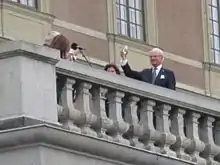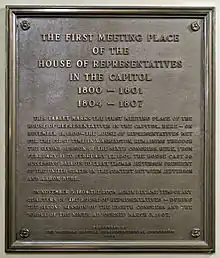နှစ်ပတ်လည်
နှစ်ပတ်လည်ဆိုသည်မှာ ရှေ့နှစ်ခါက အဖြစ်အပျက်တစ်ခု ဖြစ်ပွားသော၊ သို့မဟုတ် တက္ကသိုလ် တစ်ခုခု တည်ထောင်သော ရက်စွဲဖြစ်ပြီး၊ ထိုအဖြစ်အပျက်ကို ချီးမြှောက်လို၍လည်းကောင်း၊ သတိရတမ်းတရ၍ လည်းကောင်း ရည်ညွှန်း ပြုလုပ်သည်။ ဥပမာ၊ ဖြစ်စဉ် တစ်ခုသည် စီစဉ်ထား၍ ဖြစ်စေ၊ မမျှော်လင့်ဘဲ ဖြစ်စေ ပထမဦးစွာ ဖြစ်သည်။ ထိုနေ့မှစ နောက်တစ်နှစ်ကြာသော် ထိုဖြစ်စဉ်၏ ဦးဆုံးသော နှစ်ပတ်လည် ဖြစ်လာသည်။ ထိုစကားလုံးကို သူတော်စင်များကို ဂုဏ်ပြုဧည့်ခံသော ကက်သလစ် စားပွဲများတွင် ပထမဆုံး စတင်သုံးနှုန်းလာသည်။


တိုင်းပြည်အတော်များများတွင် စံအားဖြင့် နိုင်ငံတော်နေ့ဟု ခေါ်သော နိုင်ငံတော်နှစ်ပတ်လည်များ ဆင်ယင်ကျင်းပလေ့ရှိသည်။ နိုင်ငံလွတ်လပ်ရေးနေ့ သို့ ဖွဲ့စည်းပုံသစ် ပေါ်ပေါက်သောနေ့ သို့ အမျိုးသားနေ့ စသည်တို့ ဖြစ်နိုင်သည်။ လက်ရှိနန်းစံဘုရင်အတွက် အရေးပါသော နေ့ရက်များကိုလည်း ပွဲလမ်းသဘင် ဆင်ယင်ကျင်းပမည်သာ ဖြစ်ပြီး၊ မကြာခဏ ဂျူဘလီ (Jubilee)ဟု ညွှန်းသည်။
နှစ်ပတ်လည်အမည်များ
- မွေးနေ့များသည် တစ်စုံတစ်ယောက် မွေးဖွားသော နေ့ကို အောက်မေ့ ဂုဏ်ပြုသောအခါ အများဆုံး ပြုလုပ်သော နှစ်ပတ်လည် အမျိုးအစား ဖြစ်သည်။ တစ်ခါတစ်ရံ အကြောင်းအမျိုးမျိုးကြောင့် တရားဝင် မွေးနေ့တွင် မကျင်းပဖြစ်ဘဲ နောက်ဆုတ်၍ ဖြစ်စေ၊ ရှေ့တိုး၍ ဖြစ်စေ ကျင်းပရသည်လည်း ရှိသည်။
- မင်္ဂလာနှစ်ပတ်လည်ကို မင်္ဂလာဆောင်သော နေ့ရက်အတိုင်း မကြာခဏ ကျင်းပလေ့ရှိသည်။
- သေဆုံးနှစ်ပတ်လည်ကို ဥပမာ ဦးဘသူ ၂ နှစ်ပြည့် ၃ နှစ်ပြည့် စသည့်ဖြင့် ဘုန်းကြီးကျောင်းများ၌ ဆွမ်းကျွေးကာ အထိမ်းအမှတ် ပြုလေ့ရှိသည်။
Dies natalis (birth day)ဆိုသော လက်တင်စကားစုသည် စာအားဖြင့် မွေးနေ့ဟု အဓိပ္ပာယ်ရပြီး၊ ဘာသာစကား အတော်များများ၌ မွေးစား စကားလုံး ဖြစ်လာကာ၊ အထူးသဖြင့် ပညာရေး အသိုင်းအဝိုင်းတွင် တက္ကသိုလ် တစ်ခုခုကို စတင်တည်ထောင်သည့်နှစ်မှ စ၍ မိခင်ကျောင်း (alma mater) တည်ထောင်ခြင်း အနှစ် ၃၀ ပြည့် အထိမ်းအမှတ် စသည့်ဖြင့် ဆင်ယင်ကျင်းပလေ့ရှိသည်။
နိုင်ငံများ၏ နှစ်ပတ်လည်နေ့များကို ရောမဂဏန်း၊ သို့မဟုတ် လက်တင်စကားလုံးများနှင့် ဖော်ပြပြီး၊ ကုန်လွန်သွားသော နှစ် အရေအတွက်ကို မှတ်သားကြသည်။
လက်တင်ဘာသာမှ ဆင်းသက်သော ဂဏန်းစဉ် အမည်များ
နှစ်ပတ်လည်များအတွက် လက်တင်ဝေါဟာရများသည် ပထမဆုံး အနှစ်နှစ်ဆယ်(၁-၂၀)၊ သို့မဟုတ် ဆယ်နှစ်စီ(၃၀၊ ၄၀၊ ၆၀၊ ၇၀ စသဖြင့်)၊ သို့မဟုတ် နှစ်တစ်ရာစီ(၁၀၀၊ ၂၀၀၊ ၅၀၀)၊ သို့မဟုတ် နှစ် တစ်ထောင်စီ (၁၀၀၀၊ ၂၀၀၀၊ ၃၀၀၀ စသော) နှစ်ပတ်လည်များအတွက် တည့်တည့်ပင် မှည့်ခေါ်ထားသည်။) ဤသို့သော အခါမျိုးတွင် နှစ်တစ်နှစ်စီ၏ ကိန်းဂဏန်းအသီးသီးအတွက် လက်တင်စကားလုံးမှ ဆင်းသက်လာသည်။ သို့သော်၊ ရာစုနှစ် ကိန်းခွဲများနှင့် ဆက်စပ်သော နှစ်ပတ်လည်များ (ဥပမာ၊ ၁၂၅ နှစ်မြောက်၊ ၁၅၀၊ ၁၇၅၊ ၂၅၀ နှစ်မြောက်များ- ၁.၂၅၊ ၁.၅၊ ၁.၇၅၊ ၂.၅ ရာစုနှစ်ပတ်လည်များကို ဆိုလို) ကျင်းပလိုသောအခါ အမည်ပေးရန် အခြေအနေသည် ထင်သလောက် မလွယ်ချေ။
Roman fractions were based on a duodecimal system. From 1⁄12 to 8⁄12 they were expressed as multiples of twelfths (uncia "twelfth"; the source of the English words inch and ounce) and from 9⁄12 to 11⁄12 they were expressed as multiple twelfths less than the next whole unit—i.e. a whole unit less 3⁄12, 2⁄12 or 1⁄12 respectively. There were also special terms for quarter (quadrans), half (semis), and three-quarters (dodrans). Dodrans is a Latin contraction of de-quadrans which means "a whole unit less a quarter" (de means "from"; quadrans means "quarter". Thus for the example of 175 years, the term is a quarter century less than the next whole (bi)century or 175 = (-25 + 200).[1]
In Latin, it seems that this rule did not apply precisely for 1½. While secundus is Latin for "second", and bis for "twice", these terms are not used such as in sesqui-secundus. Instead sesqui (or ses) is used by itself.
| နှစ်ပတ်လည် | အဆင်ပြေသော အခေါ်အဝေါ် | အခြားအခေါ်အဝေါ်(...ရတု) | မှတ်ချက် | |
|---|---|---|---|---|
| မြန်မာ | အင်္ဂလိပ် | |||
| ၁ နှစ် | Annual | စက္ကူ | Paper | |
| ၂ နှစ် | Biennial | ဂွမ်း | Cotton | |
| ၃ နှစ် | Triennial | သားရေ | Leather | |
| ၄ နှစ် | Quadrennial | လိုင်နင် | Linen | |
| ၅ နှစ် | Quinquennial | သစ်သား | Wood | |
| ၆ နှစ် | Sexennial | သံ | Iron | |
| ၇ နှစ် | Septennial | သိုးမွှေး | Wool | |
| ၈ နှစ် | Octennial | ကြေး | Bronze | |
| ၉ နှစ် | Novennial | ကြေးနီ | Copper | |
| ၁၀ နှစ် | Decennial | သံဖြူ | Tin/Aluminium | |
| ၁၁ နှစ် | Undecennial | သံမဏိ | Steel | |
| ၁၂ နှစ် | Duodecennial | ပိုးသား | Silk | |
| ၁၃ နှစ် | Tredecennial | ဇာ | Lace | |
| ၁၄ နှစ် | Quattuordecennial | ဆင်စွယ် | Ivory | |
| ၁၅ နှစ် | Quindecennial | သလင်း | Crystal | |
| နှစ် ၂၀ | Vigintennial / Vicennial | ကြွေ | China/Porcelain | |
| ၂၅ နှစ် | Quadranscentennial | ငွေရတု | Silver jubilee | |
| နှစ် ၄၀ | Quadragennial | ပတ္တမြားရတု | Ruby jubilee | |
| နှစ် ၅၀ | Semicentennial / Quinquagenary | ရွှေရတု | Golden jubilee | |
| နှစ် ၆၀ | Sexagennial / Sexagenary | စိန်ရတု | Diamond jubilee | |
| ၆၅ နှစ် | နီလာရတု | Sapphire jubilee | ||
| နှစ် ၇၀ | Septuagennial | ပလက်တီနမ်ရတု | Platinum jubilee | |
| နှစ် ၁၀၀ | Centennial | ရာပြည့် ရတု | ||
| ၁၂၅ နှစ် | Quasquicentennial | Term is broken down as quasqui- (and a quarter) centennial (100 years). Quasqui is a contraction from quadrans "a quarter" plus the clitic conjunction -que "and". The term was coined by Funk and Wagnalls editor Robert L. Chapman in 1961.[2] | ||
| နှစ် ၁၅၀ | Sesquicentennial | Nature | Term broken down as sesqui- (one and a half) centennial (100 years) | |
| ၁၇၅ နှစ် | Dodransbicentennial | - | Dodrans is a Latin contraction of de-quadrans which means "a whole unit less a quarter" (de means "from"; quadrans means "quarter"). 175 years is a quarter century less than the next whole (bi)century or 175 = (-25 + 200).[1] | |
| Dodrabicentennial | Alternative Latin form of Dodransbicentennial | |||
| Dequasbicentennial | Alternative Latin form of Dodransbicentennial | |||
| Dosquicentennial | Dosquicentennial has been used in modern times[3] and this is perhaps a modern contraction of "de-quadrans". However, it seems inappropriate to combine the terms que and de when dealing with such Roman fractions. In any event, if such a conjunction was appropriate then it would perhaps more likely have been "Dosquibicentennial" (but the result is little shorter anyway).[1] | |||
| Demisemiseptcentennial | Probably a modern coined term: demisemiseptcentennial; literally one-half (demi-) x one-half (semi-) x seven (sept-) x 100 years (centennial)—also demisemiseptcentenary.[4][5] | |||
| Quartoseptcentennial | Probably a modern coined term: quartoseptcentennial; literally one-quarter (quarto-) x seven (sept-) x 100 years (centennial)—also quartoseptcentenary.[6] | |||
| Terquasquicentennial | First used by Bell Laboratories in celebrating its 175th anniversary as a corporation. Is a coined word for an anniversary of 175 years, but the elements of the word literally refer to an anniversary of 375 years, as follows: ter- (3) × quasqui- (1¼) × centennial (100 years) | |||
| Septaquintaquinque- centennial | Suggested by lexicographer Robert L. Chapman to William Safire; first appeared in Safire's column, "On Language" (The New York Times Magazine, February 12, 1995). It is a coined word for an anniversary of 175 years, but the elements of the word literally refer to an anniversary of 35,000 years, as follows: septaquinta- (70) × quinque- (5) × centennial (100 years) | |||
| နှစ် ၂၀၀ | Bicentennial | Bicentenary | ||
| နှစ် ၂၅၀ | Sestercentennial | - | To express 2½ in Latin it would be expressed as "half-three". The term relates to being halfway [from the second] to the third integer. In Latin this is "Sestertius" which is a contraction of semis (halfway) tertius (third)—hence Sestercentennial.[1] | |
| Semiquincentennial | Probably a modern coined term: semi- (half) × quin (5) × centennial (100 years) = 250 years. Used by Brown University in 2015.[7] | |||
| Bicenquinquagenary | Used by Princeton University in 1996, Reading, Pennsylvania in 1998, and Washington and Lee University in 1999.[8] It is a coined word for an anniversary of 250 years: bi- (2) × cen(t)- (100) + quinquagenary (50 years). | |||
| Quarter-millennial | Meaning one quarter of one thousand years.[9] | |||
| နှစ် ၃၀၀ | Tercentenary / Tricentenary | Tercentennial / Tricentennial | ||
| နှစ် ၃၅၀ | Sesquarcentennial | - | A modern coined term; sesquarcentennial for 350 years is deduced here from the "Sestertius" definition for 250 years above. For 350 years it relates to being halfway from the third to the fourth integer; thus a contraction of semis (halfway) and quartus (fourth); hence Sesquarcentennial. | |
| Semiseptcentennial | Probably a modern coined term: semi- (half) × sept(7) × cen(t)- (100) × centennial (350 years) | |||
| နှစ် ၄၀၀ | Quadricentennial | Quadricentenary / Quatercentenary | ||
| နှစ် ၅၀၀ | Quincentenary | Quincentennial | ||
| နှစ် ၆၀၀ | Sexcentenary | Sex(a)centennial (?) | ||
| နှစ် ၇၀၀ | Septcentennial | Septuacentennial | Probably a coined term; earliest known use in March 1988.[10] Chiang Mai Septcentennial Stadium (Chiang Mai, Thailand) was completed in 1991.[11] | |
| နှစ် ၈၀၀ | Octocentenary | Octocentennial | ||
| နှစ် ၉၀၀ | Nonacentennial | |||
| နှစ် ၁၀၀၀ | Millennial | |||
| နှစ် ၁၅၀၀ | Sesquimillennial | Term broken down as sesqui- (one and a half) millennial (1000 years) | ||
| နှစ် ၂၀၀၀ | Bimillennial | |||
နှစ်ပတ်လည်သင်္ကေတများ
နှစ်ပတ်လည်များတွင် အထူးအမည်များ ရှိသည်။ ၁၉၂၂ တွင် ထုတ်ဝေသော အင်မလီပို့စ်၏ စာအုပ်တွင် ၁၊ ၅၊ ၁၀၊ ၁၅၊ ၂၀၊ ၂၅၊ ၅၀ နှင့် ၇၅ မြောက် နှစ်ပတ်လည်နေ့များအတွက် ပေးသင့်သော မင်္ဂလာနှစ်ပတ်လည်လက်ဆောင်များကို အကြံပြုထားသည်။[12] မင်္ဂလာနှစ်ပတ်လည် လက်ဆောင်များ အကြံပြုချက်ကို နောက်ပိုင်း ထုတ်ဝေခြင်းများတွင် ထပ်မံ မွမ်းမံလာခဲ့ရာ၊ ယခုအခါ ရိုးရာပင် ဖြစ်နေလေပြီ။ ယေဘုယျအားဖြင့် ပြောရလျှင်၊ နှစ်သက်တမ်း ကြာရှည်လာလေ၊ ယင်းနှင့် သက်ဆိုင်သော ပစ္စည်းများသည် ပို၍ ကြာရှည်ခံရမည်၊ ပို၍ တန်ဖိုးရှိလာရမည် ဖြစ်သည်။
ကိုးကား
- 175th Jubilee SA 175th Jubilee။ Clipper Ship 'City of Adelaide'။ March 8, 2011 တွင် ပြန်စစ်ပြီး။ “So the name for a 175th anniversary? For now it is really up to the preference of the reader. One day one of these terms may make its way into popular usage, become accepted, and find a place in a dictionary.”
- Chapman, Robert L. (February 1965). "The History of "Quasquicentennial"". American Speech 40 (01): 53–57. doi:. “It is our policy to reply as courteously and helpfully as we can to such requests, and I answered Mr. Hatten on August 7, suggesting quasquicentennial. Since this is a history, I shall quote the letter in full: Dr. Wilfred Funk has passed your letter of July I on to us. We are happy to help, if you feel that you really want a new Latinate word meaning "one hundred and twenty-fifth anniversary". The best model upon which to form the word is "sesquicentennial", meaning "one hundred and fiftieth anniversary". We need a first element meaning "plus a fourth", analogous with "sesqui" which means "plus a half". "Sesqui" is apparently formed from "semis que", meaning "and a half". Now, both "quarta" and "quadrans" mean "a fourth", so we may begin with either "quarta que" or "quadrans que". The trick is to combine and shorten one of these as "sesqui" was combined and shortened from "semis que". If we follow the model of "sesqui" very closely, retaining the stressed vowel and final "s" of "quadrans", we get the word "quasquicentennial". Combining and shortening in other ways we can also get "quadqui-", "quansqui-", "quarsqui-", and perhaps several others. On the grounds that it is closest to the model and also probably the least ugly of the set, I would choose "quasquicentennial" (pronounced kwahskwee-) as the new word. Of course, you may decide that you do not really want or need a new word. There is no point in proliferating them needlessly. I should add, perhaps, that this word would not appear in any of our dictionaries until it had established itself in wide currency, even if you should decide to use it. I hope we have been able to help you.”
- Missouri Secretary of State Local Records Inventory Database
- "Under the Cupola". Neighbors of Batavia, July / August 2008, p. 29. The etymology of "demisemiseptcentennial" is compared to "hemidemisemiquaver", a 64th note.
- "Pickle Barrel: 175th-birthday bash planned for Dillsburg." The Patriot-News (Mechanicsburg, Penn.), Wednesday, 18 June 2008.
- "Under the Cupola". Neighbors of Batavia, July / August 2008, p. 29.
- Brown lowers the curtain on 15-month semiquincentenary။ Brown University (2015-06-11)။ 2015-06-11 တွင် ပြန်စစ်ပြီး။
- Princeton Alumni Weekly November 19, 1997 The Meaning of the 250th။ Princeton University။ March 23, 2011 တွင် ပြန်စစ်ပြီး။ “Faster, it seems, than you can say "bicenquinquagenary", Princeton's 250th anniversary has come and gone.”
- A Memorial of the Celebration of the Two Hundred and Fiftieth Anniversary of the Settlement of the Town of Northampton, Massachusetts။ City of Northampton။ 27 January 2013 တွင် The Meadow City's Quarter-Millennial Book မူရင်းအား မော်ကွန်းတင်ပြီး။ March 23, 2011 တွင် ပြန်စစ်ပြီး။
- Kersten, Glenn. "Naming the Anniversaries". Quidnunc [Suburban Library System, Burr Ridge, Ill.], March 1988.
- Architects 49: Selected and Current Work. (The Master Architect Series; 5.) Image Publishing Group, 2006. ISBN 978-1-876907-09-9
- 22. The Day of the Wedding. Post, Emily. 1922. Etiquette။ bartleby.com။